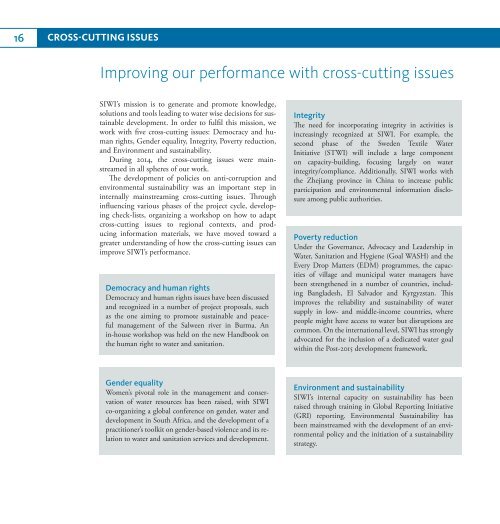2014 Annual Report
Create successful ePaper yourself
Turn your PDF publications into a flip-book with our unique Google optimized e-Paper software.
16 CROSS-CUTTING ISSUES<br />
Improving our performance with cross-cutting issues<br />
SIWI’s mission is to generate and promote knowledge,<br />
solutions and tools leading to water wise decisions for sustainable<br />
development. In order to fulfil this mission, we<br />
work with five cross-cutting issues: Democracy and human<br />
rights, Gender equality, Integrity, Poverty reduction,<br />
and Environment and sustainability.<br />
During <strong>2014</strong>, the cross-cutting issues were mainstreamed<br />
in all spheres of our work.<br />
The development of policies on anti-corruption and<br />
environmental sustainability was an important step in<br />
internally mainstreaming cross-cutting issues. Through<br />
influencing various phases of the project cycle, developing<br />
check-lists, organizing a workshop on how to adapt<br />
cross-cutting issues to regional contexts, and producing<br />
information materials, we have moved toward a<br />
greater understanding of how the cross-cutting issues can<br />
improve SIWI’s performance.<br />
Democracy and human rights<br />
Democracy and human rights issues have been discussed<br />
and recognized in a number of project proposals, such<br />
as the one aiming to promote sustainable and peaceful<br />
management of the Salween river in Burma. An<br />
in-house workshop was held on the new Handbook on<br />
the human right to water and sanitation.<br />
Integrity<br />
The need for incorporating integrity in activities is<br />
increasingly recognized at SIWI. For example, the<br />
second phase of the Sweden Textile Water<br />
Initiative (STWI) will include a large component<br />
on capacity-building, focusing largely on water<br />
integrity/compliance. Additionally, SIWI works with<br />
the Zhejiang province in China to increase public<br />
participation and environmental information disclosure<br />
among public authorities.<br />
Poverty reduction<br />
Under the Governance, Advocacy and Leadership in<br />
Water, Sanitation and Hygiene (Goal WASH) and the<br />
Every Drop Matters (EDM) programmes, the capacities<br />
of village and municipal water managers have<br />
been strengthened in a number of countries, including<br />
Bangladesh, El Salvador and Kyrgyzstan. This<br />
improves the reliability and sustainability of water<br />
supply in low- and middle-income countries, where<br />
people might have access to water but disruptions are<br />
common. On the international level, SIWI has strongly<br />
advocated for the inclusion of a dedicated water goal<br />
within the Post-2015 development framework.<br />
Gender equality<br />
Women’s pivotal role in the management and conservation<br />
of water resources has been raised, with SIWI<br />
co-organizing a global conference on gender, water and<br />
development in South Africa, and the development of a<br />
practitioner’s toolkit on gender-based violence and its relation<br />
to water and sanitation services and development.<br />
Environment and sustainability<br />
SIWI’s internal capacity on sustainability has been<br />
raised through training in Global <strong>Report</strong>ing Initiative<br />
(GRI) reporting. Environmental Sustainability has<br />
been mainstreamed with the development of an environmental<br />
policy and the initiation of a sustainability<br />
strategy.


















